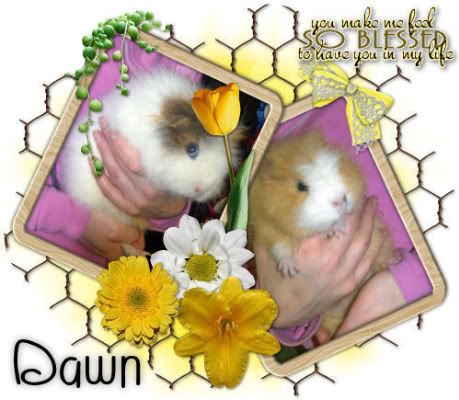Post by Dawn - Admin on May 27, 2007 14:04:27 GMT
Mouth Scabs
Mouth scabs are quite common in guineas and are often caused by acidic foods such as apple, tomato and beetroot. The skin on the lips can become weakened by the acid and left more open to infection. Some guineas seem to be more prone to this condition, so if this is the case, avoiding acidic foods all together would be recommended.
Another common cause of mouth scabs is where guineas constantly chew on the wire at the front of their cage. Often they do this to get your attention, so try ignoring them when they do this, and you may find that they stop after a while. The other option is to replace the wire with some that has smaller holes (look for the type that has approx 1cm squares). Your guinea will no longer be able to get his mouth around the wire when the holes are this small.
Scabby mouths are usually caused by a bacterial or fungal infection, and can be quite difficult to clear up. The scabs can get to be thick and nasty, and extend from the area below the nose into the corners of the mouth. It is often recommended that the scabs need to be picked off before any sort of treatment is applied, but in my experince this is very painful for the guinea and also unnecessary.
The most effective product we've found to help this condition is Galen's Garden Green Cream. It contains lots of healing ingredients that can help the problem regardless of whether it is bacterial or fungal in origin. Only small amounts are required, and the easiest way to apply it is with a cotton bud 2 or 3 times a day. The scabs will soon soften and fall off of their own accord. Once the scabs have gone and the skin underneath is healing, carry on using the cream for another 7-10 days. Infections can often return if the application is stopped too soon, especially if it was caused by fungi.
We've got 10ml pots available so that you can try out the cream before you buy a larger pot. Usually a 10ml pot will be more than enough to clear up the problem on a couple of guineas. Not for use on pregnant sows as it contains essential oils.
© Gorgeous Guineas 2007
Mouth scabs are quite common in guineas and are often caused by acidic foods such as apple, tomato and beetroot. The skin on the lips can become weakened by the acid and left more open to infection. Some guineas seem to be more prone to this condition, so if this is the case, avoiding acidic foods all together would be recommended.
Another common cause of mouth scabs is where guineas constantly chew on the wire at the front of their cage. Often they do this to get your attention, so try ignoring them when they do this, and you may find that they stop after a while. The other option is to replace the wire with some that has smaller holes (look for the type that has approx 1cm squares). Your guinea will no longer be able to get his mouth around the wire when the holes are this small.
Scabby mouths are usually caused by a bacterial or fungal infection, and can be quite difficult to clear up. The scabs can get to be thick and nasty, and extend from the area below the nose into the corners of the mouth. It is often recommended that the scabs need to be picked off before any sort of treatment is applied, but in my experince this is very painful for the guinea and also unnecessary.
The most effective product we've found to help this condition is Galen's Garden Green Cream. It contains lots of healing ingredients that can help the problem regardless of whether it is bacterial or fungal in origin. Only small amounts are required, and the easiest way to apply it is with a cotton bud 2 or 3 times a day. The scabs will soon soften and fall off of their own accord. Once the scabs have gone and the skin underneath is healing, carry on using the cream for another 7-10 days. Infections can often return if the application is stopped too soon, especially if it was caused by fungi.
We've got 10ml pots available so that you can try out the cream before you buy a larger pot. Usually a 10ml pot will be more than enough to clear up the problem on a couple of guineas. Not for use on pregnant sows as it contains essential oils.
© Gorgeous Guineas 2007






